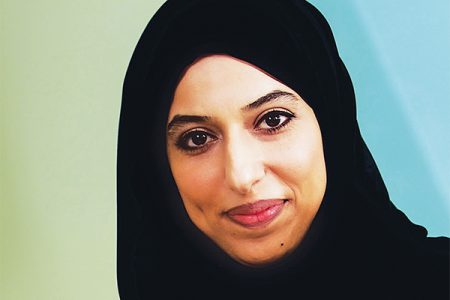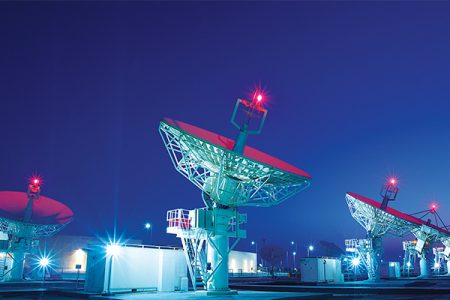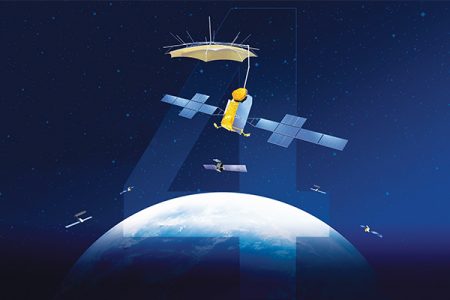 The UAE leadership has encouraged diversity in all of its sectors, and the Space and Satellite segment is no different. Proof of that is the number of women working in various space and satellite initiatives across different entities. For instance, women make up 34% of the Emirates Mars Mission team and 45% of the UAE Space Agency consists of women. At the Mohammed Bin Rashid Space Centre, 42% of the staff are women. The core science team, involved with the Hope Probe, consists of 80% female staff. Yahsat is part of this mix, and 76% of its female employees are Emirati.
The UAE leadership has encouraged diversity in all of its sectors, and the Space and Satellite segment is no different. Proof of that is the number of women working in various space and satellite initiatives across different entities. For instance, women make up 34% of the Emirates Mars Mission team and 45% of the UAE Space Agency consists of women. At the Mohammed Bin Rashid Space Centre, 42% of the staff are women. The core science team, involved with the Hope Probe, consists of 80% female staff. Yahsat is part of this mix, and 76% of its female employees are Emirati.
Fatema Ali Al Hajri started off with the company as a Teleport Systems Engineer and grew into her present role after successful stints within the Abu Dhabi-based entity as Business Development Specialist, Manager, Senior Manager and Associate Vice President of Solutions Engineering. She manages an integrated range of fixed and mobile satellite solutions for Yahsat as part of her current role.
“I manage the product engineering teams engaged in the development of innovative communication solutions for Yahsat’s customers, while ensuring consistency of user experiences. I also look after the technical aspects of all projects involving Yahsat’s strategic partners like ADNOC, Abu Dhabi Media Zone and the Government of the UAE,” she says.
Yahsat claims to be the first satellite operator in the world to offer an integrated mix of fixed and mobile satellite services and solutions. As a result, the operator is often able to guarantee its customers a better value proposition and seamless communications on any platform across land, sea or air, comments Fatema.
Having spent more than 14 years with the UAE satellite operator, Fatema has had the opportunity to see the company complete several milestones. For instance, she was part of the Yahsat Pioneers’ team that launched its first two communication satellites – Al Yah 1 and Al Yah 2. As part of the Al Yah 3 satellite programme, she led the RF Gateway project. Subsequently, for Thuraya 4-NGS, she has been actively involved in the development of its new product and solution portfolio.
In parallel, she has also worked on some exceptional projects in Africa that she believes are “unforgettable” and contribute positively to the African community.
“My involvement in the development of the Facebook Wi-Fi Express solution is especially important to me as it opened up high-speed Wi-Fi connections for a large population of users in remote Africa, making a huge difference in their lives. Similarly, the maritime voice and tracking solution, Thuraya MarineStar, which was launched last year is a big success story in Asia, effectively enabling affordable and reliable connectivity for fishermen on the high seas.”
 Yahsat’s mobile services subsidiary Thuraya also recently commenced its next-generation satellite programme.
Yahsat’s mobile services subsidiary Thuraya also recently commenced its next-generation satellite programme.
“We are building a new portfolio of next-generation mobility solutions and products to cater to market requirements. At the same time, this advanced family of mobile satellite solutions designed to support government and defense users will accelerate Yahsat’s leadership in this market, both within the UAE, regionally and globally,” explains Fatema proudly.
She adds that Thuraya’s space and ground segments will continue to support existing products and solutions, enabling service continuity during and after the completion of the Thuraya 4-NGS satellite programme.
Fatema says she is fortunate to work in a sector, where the UAE leadership has particularly encouraged diversity.
“30% of Emirati employees in Space and Satellite segments are female,” Fatema points out.
More importantly, she says Yahsat has helped nurture “the careers of its female Emirati employees” and “empowered them through on-the-job training and also by providing numerous opportunities to learn from experts from all over the world, which could be through satellite programmes, overseas conferences or training stints”.
She attributes her success to a mix of different initiatives from the company. Besides training and mentorship, Fatema lauds the Abu Dhabi entity for “grooming us to handle bigger responsibilities in the future”.

“I have been ably guided by my senior colleagues and over the years, many lady colleagues have approached me for advice and guidance on career growth. My office is always open to support and guide them. In addition, we mentor and support Emirati youth and homegrown engineering talent through initiatives like Yahsat Youth Council and Yahsat Space Lab, which is now part of Khalifa University Space, Technology and Innovation Center (KUSTIC).
Although the space sector itself is still relatively new in the UAE, she says all-round support has been available for women to make progress in this industry. However, she agrees the sector still remains male-dominated.
“The new generation of Emirati engineers and technology experts look to us for advice and insights. However, when I started out in 2007 as a novice engineer, I had to read and research a lot about space and satellites in order to understand more about them. I remember purchasing my first book on satellite – Satellite Communications Systems by Gerard Maral and Michel Bousquet. It marked my entry into the sector. Despite the advances made by women, the global space market is still largely male-dominated. We need to see more female technical experts and engineers in this field.”
Fatema, however, does not rest on her laurels. Despite having her hands full as the mother of four boys and a full-time job, she insists that one needs to constantly update themselves in this field if they are to remain competitive.
“I have done multiple courses in satellite communications, including intensive training in Link Budget. I am currently enrolled for MSc in Major Programme Management from the University of Oxford. It is a part-time postgraduate course for experienced programme managers tackling complicated assignments. The course trains us to handle challenges proactively, providing the right tools to drive a project or programme to completion on time, adhering to budget and defined deliverables.”














Add Comment